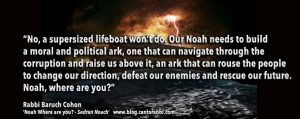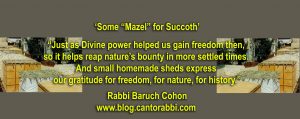LAUGHTER IS OUR NAME – Vayeyra – Gen. 18-22 – by Rabbi Baruch Cohon
This week we will read of the birth of Isaac, second of our three patriarchs. Long awaited, this child of old age gets surrounded with love and with conflict from his birth on. First of course, his mother Sarah can’t believe that she will really bear a child after a long lifetime of infertility. When the visiting heavenly messengers announce that “next year when life is due (presumably meaning 9 months from now) Sarah will have a son,” she hears this prediction from the tent behind them, and she laughs. The root word for laughing in Hebrew is, like most such words, spelled with three letters. In this case it is tzadik, khet, kuf, spelling the word tzakhak — “laugh.” Afraid of condemnation for doubting, she denies laughing at this prediction. But after she actually does bear her son, we will read her reverie where she is quoted as saying “G-d made laughter (tz’khok) of me; all who hear of this will laugh (y’-tza-khak) at me.”
Abraham names his son YiTZ-KHaK. Those same three letters! Although we never see Isaac’s name translated, it means “he will laugh.” As he grows and comes in contact with his older half-brother Ishmael, other sounds of laughter are heard. One day Sarah looks outside and sees “the son of Hagar the Egyptian, whom she bore to Abraham, meTZaKHeK” –those three letters again, this time translated several different ways. Some translators say “making sport.” Others say simply “playing.” Still others, “mocking.” One text, building on Rashi’s commentary, translates it as “become depraved.” Maybe the word just pictures the 17-year-old boy poking fun at his 4-year-old kid brother and playing him for laughs.
Several commentators depict Ishmael bragging about being the older son and therefore entitled to a double portion of the family estate. But that is no laughing matter. What actually happens to Ishmael in this week’s reading is that he is banished, along with his slave-girl mother, becomes a desert archer and marries a girl from Egypt. The only time he and Isaac do anything together will be when they join to bury their father Abraham.
We sometimes hear it said that our sense of humor is what kept the Jewish people alive all these centuries. Very likely. Given the status of Jewish comedians and comedy writers, and the joy we all share in laughter – even laughing at ourselves – whether in a Purim Shpeel, a Sholem Aleichem story or the grimace of a Mel Brooks, we can be glad for our patriarch Isaac. Linking his father Abraham, pioneer of Jewish faith, with his son Jacob, progenitor of our 12 tribes, he gave us the great gift of laughter through his own name Yitzkhak – “He will Laugh.” Whether your name is Isaac or not, you share that heritage. We all do.
Yes indeed, Laughter is our name.





